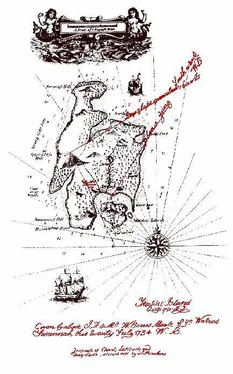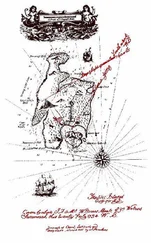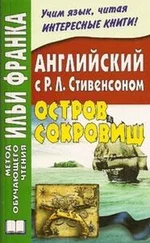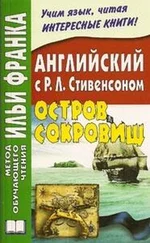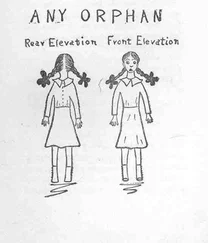наматываясь на ворот ). Then he rapped on the door (затем он стукнул по
двери) with a bit of stick like a handspike (палкой, похожей на рычаг для
поворота ворота; handspike — вымбовка — тяжелый брусок или рычаг из
дерева, который используется для вращения ворота ) that he carried (которую
нес), and when my father appeared (и когда мой отец показался), called roughly
for a glass of rum (потребовал грубо стакан рому).
tottering [`tOtqrIN] voice [vOIs] tuned [tjHnd] handspike [`hxndspaIk] roughly
[`rAflI]
Мультиязыковой проект Ильи Франка www.franklang.ru
5
2. This, when it was brought to him (его /ром/, когда он был принесен ему; to
bring — приносить, доставлять ), he drank slowly (он пил медленно; to drink ),
like a connoisseur (как знаток), lingering on the taste (медля/мешкая на глотке =
смакуя каждый глоток), and still looking about him (и все осматриваясь вокруг
себя = поглядывая) at the cliffs and up at our signboard (на утесы и вверх на
нашу вывеску).
3. 'This is a handy cove (это удобная бухта),' says he, at length (сказал он,
наконец); 'and a pleasant situated grog-shop (и славно расположенная винная
лавка; grog — грог /горячий алкогольный напиток, разновидность пунша,
приготовляемый на основе рома, коньяка или водки и горячей воды с сахаром
и пряностями и употребляемый только в холодное время года/ ). Much
company, mate (много гостей = посетителей, приятель)?'
connoisseur [kOnq`sq:] signboard [`saInbLd] length [leNT] pleasant [pleznt]
4. My father told him no (отец сказал ему, /что/ нет), very little company (очень
мало народу), the more was the pity (тем хуже = к сожалению: «тем болшье
была жалость»).'
1. in the high, old tottering voice that seemed to have been tuned and broken
at the capstan bars. Then he rapped on the door with a bit of stick like a
handspike that he carried, and when my father appeared, called roughly for a
glass of rum.
Мультиязыковой проект Ильи Франка www.franklang.ru
6
2. This, when it was brought to him, he drank slowly, like a connoisseur,
lingering on the taste, and still looking about him at the cliffs and up at our
signboard.
3. 'This is a handy cove,' says he, at length; 'and a pleasant situated grog-shop.
Much company, mate?'
4. My father told him no, very little company, the more was the pity.'
1. 'Well, then (итак),' said he, 'this is the berth for me (эта якорная стоянка для
меня). Here you matey (сюда, браток),' he cried to the man who trundled the
barrow (крикнул человеку, который катил тачку); 'bring up alongside and help
up my chest (греби сюда и помоги поднять = втащить мой сундук; to bring up
— поставить или стать на якорь; alongside — по борту, рядом ). I'll stay here
a bit (я останусь здесь немного = ненадолго),' he continued (продолжил). 'I'm a
plain man (я простой человек); rum and bacon and eggs is what I want (ром,
бекон и яйца = яичница — /вот то/, что я хочу = все, что мне нужно), and that
head up there for to watch ships off (тот мыс вон там, /хорошо подходит/, чтобы
смотреть на корабли вдали /проходящие в море/). What you mought call me
(как вы можете называть меня; mought = might )? You mought call me captain
(можете называть меня капитаном). Oh, I see what you're at — there (понимаю,
чего вы ждете — вот; to be at — намереваться );' and he threw down three or
four gold pieces on the threshold (и он бросил три или четыре золотые монеты
на порог; piece — кусок; монета ). 'You can tell me when I've worked through
that (можете сказать мне = обратиться, когда кончится это; to work —
работать, использовать; through — через, полностью ),' says he, looking as
fierce as a commander (глядя так же свирепо, как командир = с видом
командира).
Мультиязыковой проект Ильи Франка www.franklang.ru
7
berth [bq:T] continued [kqn`tInjHd] pieces [`pJsIz] threshold [`TreShquld]
fierce [fIqs]
1. 'Well, then,' said he, 'this is the berth for me. Here you matey,' he cried to
the man who trundled the barrow; 'bring up alongside and help up my chest.
I'll stay here a bit,' he continued. 'I'm a plain man; rum and bacon and eggs is
what I want, and that head up there for to watch ships off. What you mought
call me? You mought call me captain. Oh, I see what you're at — there;' and
he threw down three or four gold pieces on the threshold. 'You can tell me
when I've worked through that,' says he, looking as fierce as a commander.
1. And, indeed (действительно), bad as his clothes were (/хотя/ плоха его
одежда была), and coarsely as he spoke (/хотя/ грубо он говорил = речь его
была грубой), he had none of the appearance of a man who sailed before the mast
(он ничего не имел от внешности человека, который плавал перед мачтой =
не был похож на простого матроса / части старших лиц судового экипажа
находились позади мачты /); but seemed like a mate or skipper (а был похож на
помощника капитана или шкипера; to seem — казаться ) accustomed to be
obeyed or to strike (привыкшего, чтобы ему подчинялись = отдавать
приказания или /просто/ бить; to obey — подчиняться ). The man who came
with the barrow (человек, который пришел с тачкой) told us the mail had set
Читать дальше
Конец ознакомительного отрывка
Купить книгу
